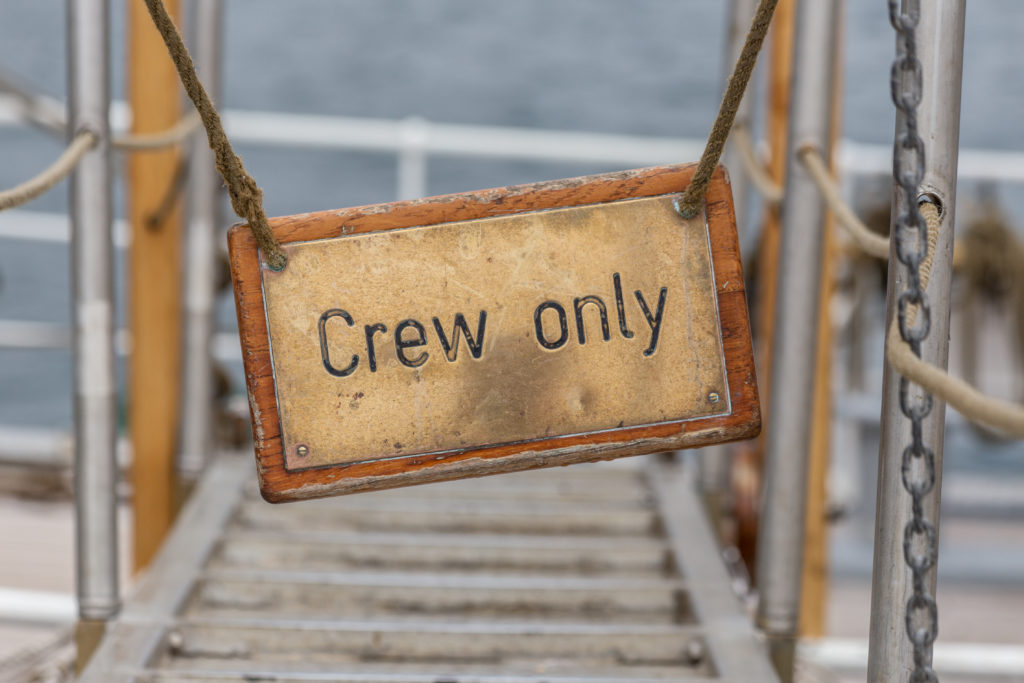The Secret to Managing Team Relationships
Captain William Bligh possessed a strong ship, crewed by forty-three talented Royal Navy seamen. He had charted a clear course and mission.
But even in the harsh industry of 18th century sailing, Bligh had a tough reputation.
Historical accounts tell us his crewmen described him as a stern, overbearing, and critical leader—frequently successful in achieving objectives, but harsh with punishment.
He was focused, but either not self-aware or, more likely, he just didn’t care.
The consequences would go down in infamy.
Bligh could have succeeded in accomplishing the mission IF he had been an InSPIRED leader—if he understood how to manage relationships with his crew.

Leadership Passion – Leadership Awareness = Mutiny!
In 1787, Bligh and his crew, along with Bligh’s comrade and leading lieutenant, Fletcher Christian, set sail from England on a ten-month journey. They were bound for Tahiti and its famous breadfruit harvests.
They reached the island, but instead of purchasing, loading, and leaving with his precious cargo right away, Bligh allowed his men to stick around for five months without any direction or discipline. Bligh refused to understand and manage his people in ways that led to success for the whole team.
Bligh never took his eyes off his prize—making it to the West Indies to resell the breadfruit and make a pile of cash.
His devotion to the mission, however, blinded him to wise execution.
Rather than respect his people, he crippled them.
When he piled his men back on board The Bounty after months of rest and socialization with the Tahitian women, he expected instant results without instituting any processes.
British historian Richard Hough notes Bligh “failed to anticipate how his company would react to the severity and austerity of life at sea … after five dissolute, hedonistic months at Tahiti.”
The problems began immediately. His men grumbled. They complained to Lieutenant Christian about leader Bligh’s strict discipline and exhausting expectations.
Bligh had a people problem—he didn’t have trust from his crew.
But at the core, Bligh failed managing his crew’s expectations.
He had permitted his men to get cozy doing nothing and now had a group of men who resisted his hard-nosed efforts to get them working again.
Bligh responded to the crew’s resistance with an even harsher crackdown.
So only three weeks into their journey home, The Bounty’s frustrated crew, including Bligh’s comrade Fletcher Christian, slipped into their captain’s cabin, tied him up at cutlass-point—and set him adrift in the Southern Pacific.
Pain Points of the Unaware
Bligh’s story has become legendary through various retellings of the infamous “Mutiny on the Bounty.”
While you probably haven’t set your boss adrift on the open sea, or been marooned by your employees, you’ve likely been tempted to do so.
Has your boss (or have YOU) ever…
- Failed to manage expectations?
- Given orders without laying out roles, processes, and goals?
- Changed course without communicating with the crew?
- Gaslighted community concerns and complaints?
- Ignored the gap between leadership teaching style and team learning style?
Lack of awareness—of self, of team, and of direction—will always lead here one way or another.
It comes down to a management of trust.
When a leader fails to lead people well, the team can’t trust that their next order will lead to success. Missions will fall apart. Even talented teammates, like Bligh’s crew, will rebel.
Through another series of adventures, Bligh eventually made his way back home. Unfortunately, he didn’t learn his lesson. His unwise and demanding leadership style led to three more mutinies.
Practical Steps for Awareness
How would others describe you and your leadership style?
It’s an intriguing question because it causes you to pause and reconsider everything you think you know about yourself and your interaction with others.
It means you have to think not only about what you intend by your words and actions, but how your words will be received, perceived, and experienced.
This simple practice of awareness is a leadership key that has kept teams afloat through even the hardest storms. How to begin? Be ready to look, listen, and learn.
- Look at your team, your leaders, and your clients. How do they interact? What frustrates them? Where do they excel? How does the environment affect morale, productivity, creativity, etc.?
- Listen to your team, your leaders, your clients. Conversations between team members will reveal the unsolved, chronic mistakes long before mutiny breaks out. If you’re stuck in the echo chamber of your own goals and expectations, you’ll miss these crucial moments.
- Learn from your team, your leaders, and your clients. The best leaders are self-aware of their own fallibility—and the room they have to grow. They look for new ideas daily to challenge their perspectives, encourage team flow, and keep the organization from stagnation.
How Will They Tell Your Story?
Everything—from how you carry yourself when you step into a room, how you listen when someone is talking, make eye contact, react to feedback, say your favorite leadership mantras, encourage or discourage—creates an experience that either inspires or exasperates.
Unfortunately, most people lack self-awareness. They prefer to remain blissfully ignorant and blame everyone else for any problems they create.
They fail to realize how their words, actions, attitudes, and personality impact performance and relationships with the people they interact with on a daily basis.
These leaders may know their strengths, but they overuse them to their own detriment.
That’s not good enough if you aspire to be an InSPIRED leader.
Leadership legacies are written by you—BUT are preserved and passed down through the followers you leave behind.
It’s too late for Captain Bligh to change his story.
What will YOU do with yours?




